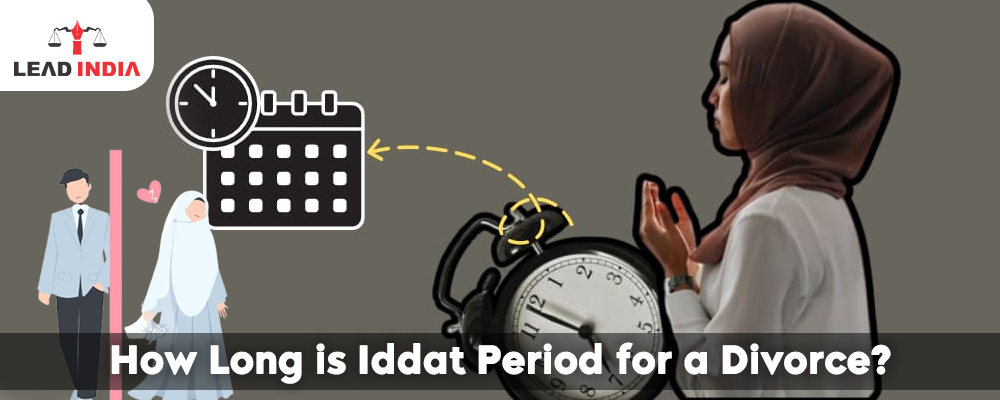The ins and outs of the divorce process can be more painful than one might think. It also affects the emotional health of the parties concerned and the legal processes that surround it. One such legal process is ‘Iddat,’ which refers to a waiting period observed after disbanding marriage in Islam.
Iddat: About
- Iddat is a period observed by women in Islam after they are divorced or after the husband dies. Another name for it is the waiting period. For the wife, it is a waiting period that obligates her to remain single for a certain duration. The concept of Iddat aims to ascertain whether the woman is pregnant before undertaking another marriage.
- In Islamic jurisprudence, Iddat has different lengths in relation to the kind of divorce in question. The Iddat period lasts for three menstrual periods in case the husband initiates the divorce. If the wife is the one who a divorce, the Iddat period lasts for three menstrual cycles or three lunar months, whichever takes longer.
Need A Legal Advice
The internet is not a lawyer and neither are you. Talk to a real lawyer about your legal issue

Legality of Iddat
- Iddat has certain legal effects on the parties in a marriage dissolution in Islam. During the Iddat, the woman is still recognize as the marry woman of her ex-husband in the eyes of the law. Therefore, she cannot remarry, and if there is sexual contact during this time, it is regard as fornication by Islamic standards.
- The Iddat phase affects the division of property and inheritance as well. Where a woman is pregnant at the time of divorce, the baby will be recognize as belonging to the ex-husband, and the child will have inheritance rights to their father.
- In instances where the woman is not pregnant, the issues regarding the distribution of properties are resolve after the Iddah has elapse, at which point the couple is no longer address as husband and wife.
How Long is the Iddat Period for a Divorce?
- In Islam, the iddat period for a divorced woman is often three menstrual cycles, which is to ascertain that a woman is not pregnant as well as to preserve lineage. When a woman has a child, Iddat elongates to her confinement of the child.
- In the case of a widow, the Iddah period is four lunar months and ten days.
- The practice of observing Iddat is also done in reverence of the previous marriage and there is time to adjust before getting marry again or taking other decisions emotionally.
Prohibition of marriage during Iddat
- Among the limitations placed on women during the iddat period is the prohibition against taking another husband or having sexual intercourse until the iddat period is over.
- The iddat duration is dependent on particular conditions. In the circumstance of divorce, it is three (3) lunar months or that which is longer (whichever is longer). In the case where a husband dies, the iddat period is four months and ten days.
- The aim of imposing the iddat period during which marriage is forbid to women has its reasons. In the first place, it guarantees that no child born after a divorce or death of the spouse will be ascribe to her new husband. In the second place, it provides the woman with an opportunity to think over her position. In the third place, it serves to minimize undue stress that may cause a woman to act soon after a divorce or the death of her spouse.
- It should be highlight that the ban on marital relations during the Iddat span is only for women. There are no similar restrictions on men. The woman can get marry again after the iddah time is over. Any marriage that takes place during the period of Iddat is not valid, according to Islamic law, and is therefore void.
Maintenance during Iddat
- While the wife is within the period of iddat, she cannot demand maintenance from the estate of her husband as she is an inheritor of the estate. This is so because it is the husband only who is charge with the duty of maintaining the wife and not the other beneficiaries.
- In 1985, the Supreme Court of India pronounced a judgment in the case of Shah Bano, where it decreed maintenance for a divorced Muslim woman from her husband even after the lapse of the iddat period. This ruling was contrary to the provision of the Muslim Personal Law which allows for maintenance only for the iddat period of three months.
- Conservative Muslims strongly objected to the ruling, insisting that it was against their religious practices and that there was no jurisdiction for interference by the court in personal law matters. The Indian government passed the Muslim Women (Protection of Rights on Divorce) Act owing to opposition from the Muslim community, which rendered the court’s decision ineffective and limited maintenance only to the iddat period.
In addition to being an unpleasant procedure, divorce has legal ramifications that need to be address. Furthermore, Islamic law mandates a waiting period following divorce, known as Iddat. In addition to offering time for introspection, grieving, and making sure the lady is not pregnant before getting marry again, this waiting period has legal ramifications for all parties.
One can talk to a lawyer from Lead India for any kind of legal support. In India, free legal advice online can be obtain at Lead India. Along with receiving free legal advice online, one can also ask questions to the experts online free through Lead India.





 Talk to a Lawyer
Talk to a Lawyer